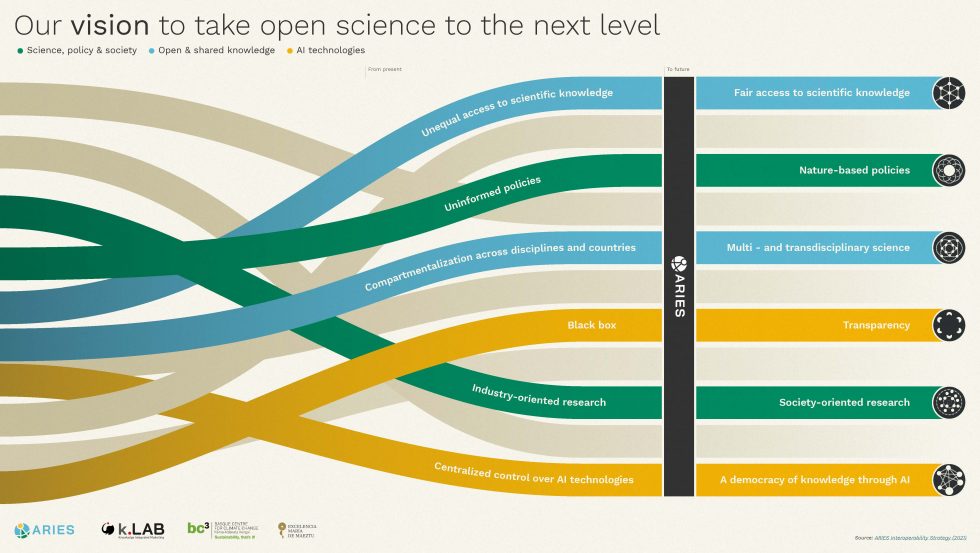Researchers use semantic AI to integrate complex knowledge and apply it toward environmental decision-making


“Researchers use semantic AI to integrate complex knowledge and apply it toward environmental decision-making”
- A new article led by researchers at the Basque Centre for Climate Change (BC3) and Ikerbasque shows how semantic-driven integration technologies are able to integrate independently produced data and models in the field of environmental sustainability.
- This is an important step towards achieving data and model reusability and interoperability and moves open science forward, with the prospect of favouring knowledge integration and scientific evidence synthesis that may benefit both the science and policy communities.
Balbi, S., Bagstad, K.J., Magrach, A. et al. The global environmental agenda urgently needs a semantic web of knowledge. Environ Evid 11, 5 (2022). https://doi.org/10.1186/s13750-022-00258-y
Bilbao, 2 Mach 2022. A new article led by four BC3’s and Ikerbasque’s researchers shows how the application of computer-based intelligence can make human knowledge interoperable at a large scale to address complex social-ecological issues. The research, published in the peer-reviewed journal Environmental Evidence, explains how the use of machine reasoning and semantic modelling in artificial intelligence (AI) systems, rather than relying solely on machine learning, helps to connect existing, web-accessible data and models, which is a vital step towards open synthesis and knowledge reusability to support decision-making.
By labelling peer-reviewed, web-based scientific information in ways readable by both humans and computers, and using common standards for machine-actionable data and models, machines can search, organize, reuse and combine information quickly and in novel ways, reducing serving system’s latency and achieving real-time modelling.
Researchers applied the semantic-driven integration technology ARIES to support the System of Environmental-Economic Accounting (SEEA)—an international statistical standard that measures linkages between national economic accounts and natural capital stocks and ecosystem service flows in physical and monetary terms, as well as information on the extent and condition of ecosystems.
The result, the ARIES for SEEA online platform released in April 2021, confirmed the potential of semantic knowledge integration technologies for effective automated data collection required to monitor complex linked socioecological systems. The same approach could be used to integrated independently produced data and models served online in more scientific and decision-making fields.
Ikerbasque Professor Ferdinando Villa, Lead Investigator of the ARIES Project at BC3 and senior author of the article, said: “What we’re doing with ARIES and the integrated modelling approach is maximize the value of scientific information – data, models and the understanding they embody – while ensuring its usability and modularity by design, rather than by intention. Our goal is to build a knowledge commons encompassing the best scientific knowledge about the earth and sustainable development, where seamless integration and generation of new, multidisciplinary knowledge from independently developed components is facilitated.”
Ikerbasque Professor María José Sanz, Scientific Director at BC3 and co-author of the article, said: “At BC3 we envision ARIES as an independent and public-interest driven infrastructure of connected knowledge that is not dominated by large technological companies and places users and their data ownership firmly in the centre. ARIES is already emerging as a digital infrastructure of global interest, thanks to the national and Basque Government’s support. Our goal now is to keep expanding it to meet the growing global demand for sustainable management of our natural resources.”
Ikerbasque Research Fellow Stefano Balbi, Managing Director of the ARIES Project at BC3 and lead author of the article, said: “Today’s distributed corpus of human intelligence, including the scientific publication system, cannot be exploited with the efficiency needed to meet current global social-ecological challenges. There is an almost forgotten branch of AI that has a key role to play: We argue that the time is ripe for a new take on the subject.”
Additional research authors also included collaborators from the United States Geological Survey, the World Wildlife Fund, and the Ca’ Foscari University of Venice. The authors are a part of the Integrated Modelling Partnership, which curates the ARIES Project and brings together institutions contributing to designing and building a fully integrated information landscape.

Background
The ARIES Project started in April 2007 at the Gund Institute for Ecological Economics of the University of Vermont, sponsored by a $1M grant from the U.S. government’s National Science Foundation. A prototype of the model building system was developed over the following year, and a functional prototype was made available online in 2012. Since 2010, the project has been based at BC3, where the technology has continued developing ever since.
The ARIES for SEEA Explorer was released in April 2021 by BC3 in collaboration with the Statistics Division of the United Nations Department of Economic and Social Affairs (UN DESA) and the United Nations Environment Programme (UNEP) for rapid, standardized and customizable natural capital accounting. Shortly following the adoption of the SEEA Ecosystem Accounting standard by the United Nations in March 2021, the ARIES for SEEA Explorer was made available on the UN Global Platform in order to accelerate SEEA’s implementation worldwide.

